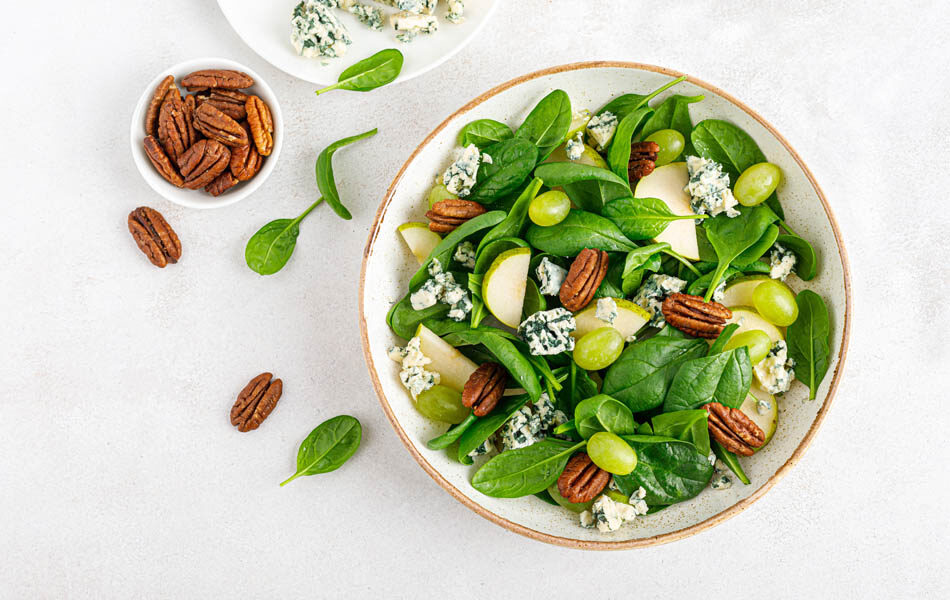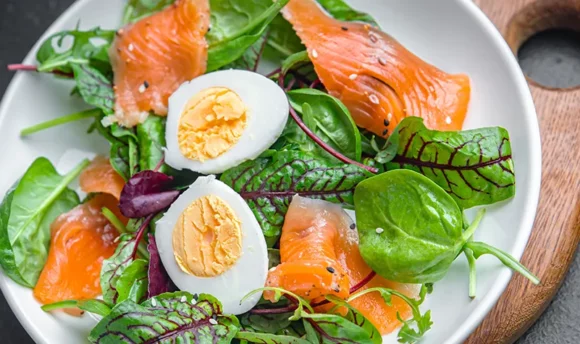Keto for Vegetarians: 4 Tricks to Do Keto Without Meat
People think that you only eat chicken breast and red meat while on keto. We are debunking a myth that this diet can’t be the right choice for vegetarians.

Keto has become a wildly popular diet in recent years. However, most keto recipes include large swaths of meat.
Is it possible to do a keto diet without meat? For vegetarians, going keto might seem like a far-off dream.
Thankfully, our keto diet experts at Health Reporter are ready to explain how you can have a vegetarian keto diet. This article will go over everything you need to know to transition smoothly and maintain a keto diet as a vegetarian.
Can You Do Keto as a Vegetarian?
Yes, absolutely. A vegetarian keto diet is the same as a regular ketogenic diet, except it eliminates meat and replaces it with plant-based protein and fat.
It may require more planning than your typical keto diet, but there’s no reason that someone who is plant-based cannot fully enjoy all of the health benefits of a ketogenic diet.
Since keto is generally considered a high-fat, low-carb diet, you’ll need to get creative with your fat source.
Can Vegetarians Get Into Ketosis?
Yes, a vegetarian keto diet can get you into ketosis.
Rather than relying on meat fat, a vegetarian keto diet will rely on plant-based protein and plant-based fats like avocados, seeds, nuts, and coconut oil. However, you may find it harder to stay in ketosis.
Because most keto dieters get their healthy fats from animals, it might be slightly harder to find all of the right plant-based fats to stay in ketosis.
However, anyone can do it! Many keto vegetarians have proven that a keto diet doesn’t need meat.
Keto for Vegetarians: 4 Tips for an Easy Transition
Starting a keto diet can be a little intimidating for newcomers.
Here are four easy steps to make your transition into a high-fat, low-carb diet much more manageable.
#1 Eat eggs daily
Eggs are a great source of fat and protein, especially for people looking to have a vegetarian keto diet.
There’s a reason why eggs are often featured in keto-friendly recipes! They’re easy to make, versatile, and help you reach your fat intake.
Eggs contain very few grams of carbohydrates, making them a perfect source of fat without affecting your carb intake. Not to mention, one egg is only about 70 calories, while being 6 grams of protein.
#2 Use supplements (if needed)
There’s no shame in using supplements if you need them. There are plenty of powder-based and pill-based keto diet supplements that can help you reach ketosis if need be.
You’ll want to take them alongside your regular high-fat diet, but they can benefit.
These supplements can also come in the form of protein powders. Many people on keto get their protein from animal products. So, if you’re on a vegetarian keto diet and are struggling to get protein, try plant-based protein powders.
#3 Always calculate your macros
Many people find themselves kicked out of ketosis when they don’t calculate and track their macros.
You should be aware of how many of your calories are coming from fat, protein, and carbs. Make sure you use some kind of tracking system to know your macros.
You want to stay away from “bad fats” and keep your focus on healthy fats, like avocado oil, nuts and seeds, coconut oil, olive oil, and other whole foods. Healthy fat, good sources of protein, and minimal carbs will keep your macros balanced.
#4 Eat plenty of low-carb vegetables and fat
The basis of a keto diet is staying low in carbs. Your carb intake should be 5–10% of your daily calories, and your daily carb ration shouldn’t be any more than 50 grams.
Low-carb vegetables and fat sources will be your best friend on a vegetarian keto diet.
Some of the best low-carb veggies include bell peppers, mushrooms, zucchini, spinach, green beans, and avocados. You can use all of these veggies in all kinds of delicious and unique recipes, so you’ll never get bored.
Vegetarian Keto Food List
Once you’ve smoothly transitioned to a vegetarian keto diet, you’ll want to watch the kinds of foods you can safely eat.
Here is a list of keto-friendly vegetarian foods:
- Non-starchy vegetables: Things like artichoke, tomatoes, beans, avocado, lettuce, carrots, cauliflower, radishes, sprouts, onion, and mushrooms are all excellent non-starchy vegetables.
- Nuts and seeds: Keep an eye out for delicious nuts and seeds like peanuts, pecans, flax seeds, walnuts, chia seeds, hazelnuts, macadamia nuts, or sesame seeds.
- Healthy fats: Getting your fat sources from healthy oils like olive oil, coconut oil, avocado oil, and MCT oil can significantly help keep your fat intake up.
- Berries: They make for great snacks by themselves or a tasty additive to smoothies or Greek yogurt. Try blueberries, raspberries, or blackberries for your keto-friendly berry snack.
- Protein: Due to the vegetarian ketogenic diet not being able to get a large portion of their diet from animal protein, you’ll have to get a little more creative. Thankfully, vegetarians have gotten plenty of protein from eggs, tofu, and even tempeh.
- Beverages: Keto-friendly beverages are low in sugar, alcohol-free, and free of artificial sweeteners. Some of our favorite keto-friendly beverages are green or herbal teas, black coffee or coffee with natural sweetener, water with lemon juice, and sparkling water.
Foods to Avoid on Keto for Vegetarians
Not every vegetarian food is keto-friendly, however. You want to be careful about what you eat.
A healthy vegetarian keto diet should avoid these foods:
- Starchy vegetables: These vegetables have a lot of starch and can up your carb intake or even kick you out of ketosis. Avoid things like corn, white potatoes, beets, turnips, arrowroot, sweet potatoes, and green peas.
- Grains and legumes: Grains and legumes are another starchy food that one should avoid on vegetarian keto. Be aware of peanuts, peas, lentils, chickpeas, beans, and lupins.
- Sugar and sugary drinks: Try to avoid both regular soda and diet soda with artificial sweeteners. Keep sweets to a minimum. One or two won’t kick you out of ketosis, but they should be avoided.
- Fruits: Most fruits are very high in sugar and carbs. Avoid high-carb fruits like bananas, mango, pineapple, orange, cherries, and pears. Some fruits have a higher fiber count and can be eaten after removing fiber from net carbs.
- Alcohol: Steer clear of alcohol while on a keto diet! Alcohol, in particular, slows down the rate of ketosis, which can kick you out of ketosis entirely if you’re not careful.
- Processed foods: Some people do what is called “dirty keto,” where the only thing that matters is the carb and fat count. But, processed foods will make staying in ketosis much harder, so it’s best to avoid them. Get your meals from whole foods.
Keto for Vegetarians: Meal Plan
The scope of vegetarian keto recipes is vast. There’s something out there for everyone, no matter your taste or preferences.
Here’s a quick example of a meal plan for a keto vegetarian diet that encourages ketosis without eating meat.
- Breakfast: Start with some kind of egg dish. Eggs are a great source of fat and protein. Make sure you get your veggies in there, too. Try a spinach omelet or a frittata with tomato and cheese.
- Lunch: There are plenty of great keto lunches, even for vegetarian keto. Try something like a vegetarian keto lasagna, a vegetarian keto burger, or even some stuffed avocado with egg.
- Dinner: A vegetarian keto dinner could start with a Greek salad and move on to vegetarian keto risotto, a keto burger, or even an avocado salad.
As you can see, there are plenty of options that allow you to have a varied vegetarian keto diet.
Vegetarian Keto Snacks
Of course, it wouldn’t be keto dieting without some delicious keto-friendly snacks. Let’s look at some of the best keto snacks for a vegetarian diet.
- Olives
- Pumpkin seeds
- Flax crackers
- Chia seeds pudding
- Greek yogurt with berries
- Celery and guacamole
- Nuts and seeds (only if limited)
These snacks are high in fat and low in carbs, and some are even a great source of protein. If you find that you cannot get all of your macros during your daily meals, you may want to consider snacking between meals to reach your goal.
Risks of Keto for Vegetarians
For most people, going on keto doesn’t pose many risks. There are ways to get all of your nutritional needs met through a keto diet alone. However, many people on a vegetarian keto diet may find that this isn’t entirely true.
Unfortunately, there are several risks for vegetarians who decide to go on a keto diet. It’s essential to speak with your trusted medical professional before taking the leap into a keto lifestyle.
#1 Nutritional deficiencies
Like many vegetarian diets, if you’re not fully committed and aware of what you need in terms of nutrients, you may find yourself at risk of nutrient deficiencies. Ensure that you’re getting your critical nutrients in your diet, whether a keto vegetarian or a keto vegan diet.
#2 Keto flu
The keto flu is a set of symptoms that your body goes through as it switches from burning carbohydrates to burning fat as its primary fuel source. With a vegetarian keto diet, you are more likely to feel exhausted as your body tries to catch up with its new energy source. On the other hand, keto flu is a common symptom even if you are following the usual keto.
#3 It can be hard to maintain
A keto diet led by a vegetarian may be harder to keep up with and maintain. People who get most of their fat sources from animal products have a much easier time. However, even if it’s difficult, it isn’t impossible.
A Word From Nutritionist
The keto diet aims to encourage your body into a fat-burning state called ketosis. During ketosis, your body burns stored fat to create energy called ketones, which your body then uses in place of carbohydrates.
A keto diet’s primary goal is to burn fat and weight loss for many people. However, there are a whole host of other health benefits, such as blood sugar control, lowered blood pressure, lowered risk of heart disease, and more.
Wanting to explore a ketogenic diet without giving up your vegetarian diet isn’t as hard as it may seem. For quite a while, the idea of a keto diet was permeated with the image of eating meat. Most keto recipes included fatty cuts of animal products.
But, with a lot of dedication, the keto vegetarian diet was born, and more and more people are joining its ranks. Your way of eating shouldn’t dictate whether or not you can participate in an excellent diet for weight loss.
If you find yourself exhausted, fainting, or frequently sick, you should immediately stop your keto diet and talk to your doctor, especially if you’re on a vegetarian diet.
Some people shouldn’t attempt a keto diet, regardless of the health benefits. If you’re pregnant or nursing, have type 1 diabetes, are at risk for heart disease, have kidney damage, have a liver condition, or don’t have a gallbladder, you should refrain from starting keto.
Conclusion
Keto is a popular diet plan that more and more people are trying out, either for weight loss or other health benefits. However, if you want to avoid meat, you may be worried about whether or not keto is for you.
Thankfully, a keto for vegetarians is perfectly acceptable. There are ways to enjoy a plant-based diet without giving up your keto goals. So long as you are aware of your macros and potential nutritional deficiencies, you should be good to go.
The keto world is full of people with all kinds of different preferences when it comes to food. Whether you’re vegetarian, vegan, or just a picky eater, you’ll be able to find keto-friendly recipes that will make your keto diet much easier to enjoy.

















































 Select your language:
Select your language: 








